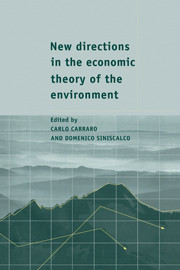New directions in the economic theory of the environment

01.10.1997
Carlo Carraro, Domenico Siniscalco
Cambridge University Press
In recent years scientists have become preoccupied with a set of new
environmental phenomena, such as global warming, ozone layer depletion,
acid rains, fresh water and ocean pollution, desertification,
deforestation and the loss of bio-diversity. The crucial and pressing
nature of these issues has spawned a new wave of research in
environmental economics, the gist of which is reported in this volume.
The volume provides broad surveys of the developments of the new
economics of the environment and reports the state of the art on a new
set of environmental problems, analytical tools and economic policies.
The importance of the new approach is that environmental problems are no
longer isolated from all other economic dimensions. Throughout the
volume they are analysed in an open, generally non-competitive economy
with transnational or global externalities. The first part deals with
the relationship between the environment, economic growth and
technological innovation. The second part analyses the optimal design of
environmental taxation, while the third part considers the
international dimension of environmental policy.
Contributors: S. Barrett, A. Beltratti, F. Bloch, A. L.
Bovenberg, C. Carraro, M. Hoel, H. Konishi, M. Le Breton, M. Rauscher,
D. Siniscalco, A. Ulph, D. Ulph, S. Webe
In recent years scientists have become preoccupied with a set of new environmental phenomena, such as global warming, ozone layer depletion, acid rains, fresh water and ocean pollution, desertification, deforestation and the loss of bio-diversity. The crucial and pressing nature of these issues has spawned a new wave of research in environmental economics, the gist of which is reported in this volume. The volume provides broad surveys of the developments of the new economics of the environment and reports the state of the art on a new set of environmental problems, analytical tools and economic policies. The importance of the new approach is that environmental problems are no longer isolated from all other economic dimensions. Throughout the volume they are analysed in an open, generally non-competitive economy with transnational or global externalities. The first part deals with the relationship between the environment, economic growth and technological innovation. The second part analyses the optimal design of environmental taxation, while the third part considers the international dimension of environmental policy.
Contributors: S. Barrett, A. Beltratti, F. Bloch, A. L. Bovenberg, C. Carraro, M. Hoel, H. Konishi, M. Le Breton, M. Rauscher, D. Siniscalco, A. Ulph, D. Ulph, S. Webe
